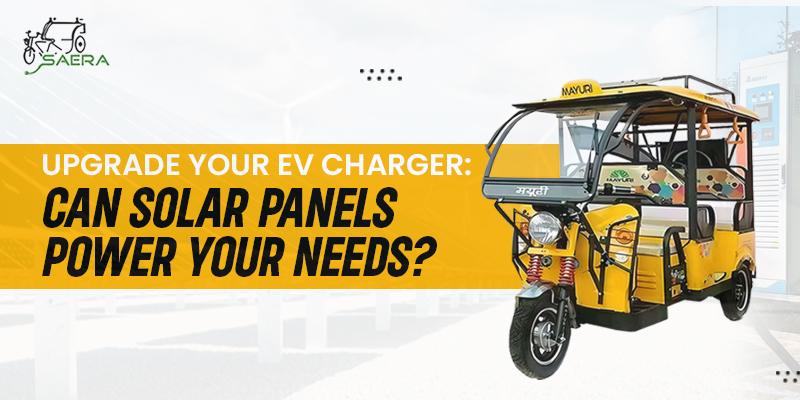As the push for sustainability grows stronger, solar-powered electric vehicle charging is becoming increasingly appealing. Harnessing the sun’s bountiful rays offers benefits both environmentally and financially. While making the switch involves careful planning, the potential rewards encourage thoughtful consideration. This blog explores the promising landscape of solar-powered EV charging, highlighting its potential cost savings, environmental advantages, and crucial considerations for those contemplating this green shift.
Understanding Solar-Powered EV Charging
When you use solar-powered chargers to fuel up your battery-operated cargo 3-wheeler, you are basically tapping into the sun’s energy using solar panels. This process takes place through photovoltaic panels that convert sunlight into electricity. Relying less on typical grids lightens our impact, helping steer toward green practices. Countless advocates are working to leave future generations a healthier planet through innovations like this.
Benefits of Solar-Powered EV Charging
Switching to solar-powered electric vehicle charging provides numerous advantages. Reducing our carbon output through lowered dependence on fossil fuels supports global efforts to counter climate change’s growing threats. With solar offsetting grid usage, families may see savings on monthly electricity bills – valuable at a time when inflation weighs heavy. And leveraging the sun’s generous gifts fosters greater control over power sources, strengthening commitments to sustainability as a cleaner energy future takes shape worldwide. Renewable independence affords peace of mind; as demands rise, charging needs will still be met. Overall, the benefits of making the switch empower lifestyle decisions in line with conscience and community well-being for generations to come.
Considerations for Implementing Solar-Powered EV Charging
While the advantages of solar-powered EV charging are compelling, a meticulous evaluation of various factors is imperative for a smooth transition. Initial setup costs, the extent of sunlight exposure, system efficiency, and ongoing maintenance requirements all contribute to the overall feasibility and long-term viability of solar-powered charging solutions. Understanding and addressing these considerations play a pivotal role in ensuring the successful integration of solar-powered EV charging into your lifestyle or charging station operations. You can discuss this in detail with the best battery rickshaw manufacturers to know if this type of charging is suitable for your EV or not.
Integration with Existing EVSE Infrastructure
For EV owners and charging station operators looking to embrace solar-powered EV charging, seamless integration with existing Electric Vehicle Service Equipment (EVSE) infrastructure is key. Careful planning and coordination are required to assess the compatibility of solar-powered systems with current charging setups. Evaluating potential installation constraints and understanding the impact on charging efficiency are essential steps to guarantee a hassle-free and efficient integration process.
Suggested Read: A Comparison Of Lead-Acid And Lithium-Ion Options To Find The Right Battery For Your Electric Vehicle
Experience a New Era in Transport with Saera Electric Auto!
If you are someone who truly cares about the environment and makes choices that matter, shifting to EVs is just the right step. At Saera Electric Auto, our battery-operated cargo 3-wheeler is designed for unmatched efficiency and reliability. Want to discover the future of sustainable transportation? Check out our top-tier range of electric vehicles now!

